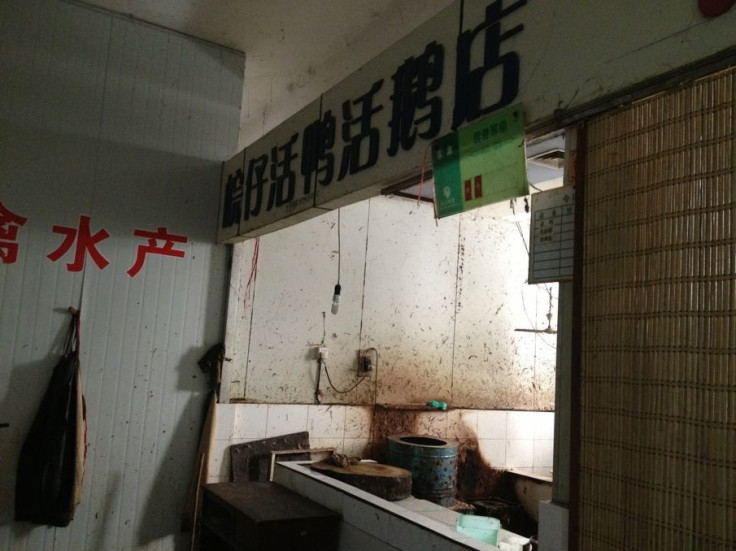Avian Flu H7N9: IBTimes Reports Back From Four Cities With Bird Flu Outbreaks


A new strain of avian flu, H7N9, has caused an outbreak in China recently, infecting 21 people and leaving six dead. Since the flu broke out, public opinion has tended to compare the illness to the SARS outbreak that occurred 10 years ago. Whether the government's response to an outbreak has improved over the decade, this issue has become highly visible and debated.
“The news transparency this time around is far better than it was 10 years ago during the SARS outbreak, but still not nearly enough," Li Chengpeng, a Chinese commentator said on Weibo, a Chinese equivalent of Twitter, regarding H7N9. "When faced with a large scale outbreak, it is important to alleviate the people’s fear as well as their symptoms."
Reporters from IBTimes China visited Nanjing, Hangzhou, Wuxi and Shanghai, cities that have been hit by H7N9. The following is a firsthand report.
Nanjing: Hospital Waited Five Days to Diagnose After Family Raised Concerns
On Wednesday afternoon, Zhang Ping sat with her uncle and aunt in the lobby of a hospital in Nanjing. The three of them were the only ones wearing surgical masks in the crowded lobby.
“My mother’s illness would never have gotten so bad if it weren’t for the hospital’s neglect,” Zhang Ping said in tears behind her surgical mask.
Zhang’s mother showed signs of pneumonia and was hospitalized in March. On April 1, Zhang, having heard of cases of H7N9 in China, raised concerns that H7N9 was what her mother may have. The hospital did not run relevant tests, and continued to treat Zhang’s mother for pneumonia. On Monday, her condition worsened, and on Tuesday, Zhang’s mother was suspected of having an H7N9 infection. She was diagnosed officially on Thursday, making her the fifth case of avian flu in Jiangsu province.
Neither the hospital nor the Disease Control Center of Jiangsu asked Zhang and her family to withdraw into quarantine. The family decided to quarantine themselves.
From Zhang’s point of view, the reason it took three days from suspected case to actual diagnosis is that the authorities did not realize the severity of the disease and were not prepared for it.

Shanghai: Patient’s Family Watches Over Patient Through Glass Separation
In Shanghai, a 67-year-old female patient named Cao, is housed in a corner of the respiratory unit ICU in Ruijin Hospital. During visiting hours, six or seven members of Cao’s family look through a glass separation at her. Considering each room is allotted a single protective apparatus, only one of Cao’s family members at a time can go in to see the patient while the others watch behind the glass.
“Since avian flu cannot be passed between two people, what’s the harm in letting them in to see their family?” is a question typically asked. Cao’s family declined to comment about this, but bystanders and other patients questioned the validity of the hospital’s regulations.

Hangzhou: Livestock Markets Still Open with No Protective Measures in Place
On Thursday, a quail carrying the H7N9 virus was found in a livestock shop in Hangzhou. On Friday, the shop’s poultry inventory was destroyed and its transactions halted. On the same day, the city banned the feeding of pigeons in its tourist quarters.
Following news of the avian flu outbreak, few chickens and ducks exchanged hands, and livestock markets were visited infrequently. However, the largest livestock trading market had not been shut down. When the reporter went to the market, most birds were kept in cages, but no one was buying.
Despite the two confirmed cases of avian flu in Hangzhou, only one person in the market wore a face mask. There were no announcements regarding H7N9, and shop owners moved through bird cages without any protective measures. “Why bother with face masks, we’re used to this scene after so many years of working in the market,” a shop owner calmly said.

Wuxi: Center for Disease Control Not Grasping Outbreak
In one corner of the lobby in the People’s Hospital in the city of Wuxi, a H7N9 avian flu checkpoint has been established. Zhang, the first patient from Wuxi confirmed to have avian flu, has been treated here. According to the official hospital bulletin, Zhang is still gravely ill. However, the hospital refuses to reveal more about Zhang’s condition, and refers any questions regarding avian flu to the city’s Center for Disease Control.
Strangely, the Center for Disease Control claims to not know the details of Zhang’s condition, and instead says doctors in the hospital would know more. Currently, cases of H7N9 are being treated in accordance with newly announced national guidelines. Other than that, the general public is not protected from further outbreak, says a Center spokesperson. Even in Wuxi residential areas where the flu has already hit, there are not any announcements. In fact, many residents do not know at all whether fellow neighbors have fallen sick to bird flu.
The original story appeared in IBTimes China.
© Copyright IBTimes 2024. All rights reserved.




















